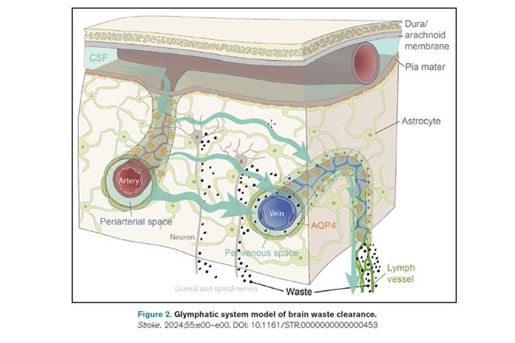Impact of Sleep Disorders and Disturbed Sleep on Brain Health
Published: January 18, 2024

- Accumulating evidence shows that there appears to be a link between sleep disorders and adverse brain health; from stroke to subclinical cerebrovascular disease to outcomes (Alzheimer’s disease and Alzheimer’s related dementias).
- Sleep disorders such as sleep-disordered breathing (e.g., obstructive sleep apnea), and other sleep disturbances, as well, some of which are also considered sleep disorders (e.g., insomnia, sleep fragmentation, circadian rhythm disorders, and extreme sleep duration), have been associated with adverse brain health.
- This scientific statement presents evidence supporting an association between sleep disorders and disturbances and poor brain health including stroke, dementia and other cognitive impairments. and a look at potential opportunities for prevention and early treatment.
Impact of Sleep Disorders and Disturbed Sleep on Brain Health
Dr. Rebecca Gottesman, Chief of the Stroke Branch at the NINDS Intramural Research Program, examines the vital role sleep plays in overall brain health. The discussion highlights the AHA's new scientific statement on the influence of sleep disorders and disturbed sleep on the health of the brain. She delves into the implications of sleep disorders such as sleep apnea on the risks of stroke and dementia, mechanisms linking sleep disorders/disturbances with poor brain health, insights into potential preventative measures, and emphasizes the need for further research to understand these connections more accurately. The video also address the disparities in sleep disorders and brain health in racial and ethnic minorities, stressing the importance of creating scalable interventions.
Supporting Materials
- Commentary: Sleep and Brain Health: Commentary on a New AHA Scientific Statement by Philip B. Gorelick, MD MPH, Professor of Neurology
- Top Things to Know: Impact of Sleep Disorders and Disturbed Sleep on Brain Health
- Slide Set (PDF)
Recommended Reading
- Life’s Essential 8: Updating and Enhancing the AHA’s Construct of Cardiovascular Health
- A Primary Care Agenda for Brain Health
- Cognitive Impairment After Ischemic and Hemorrhagic Stroke
- Strategies for Promotion of a Healthy Lifestyle in Clinical Settings
- Obstructive Sleep Apnea and Cardiovascular Disease
- Sleep-Disordered Breathing and Cardiac Arrhythmias in Adults: Mechanistic Insights and Clinical Implications
- Sleep‐Disordered Breathing and Cardiovascular Disease in Children and Adolescents
- Menopause Transition and Cardiovascular Disease Risk: Implications for Timing of Early Prevention
- Lifestyle and Risk Factor Modification for Reduction of Atrial Fibrillation